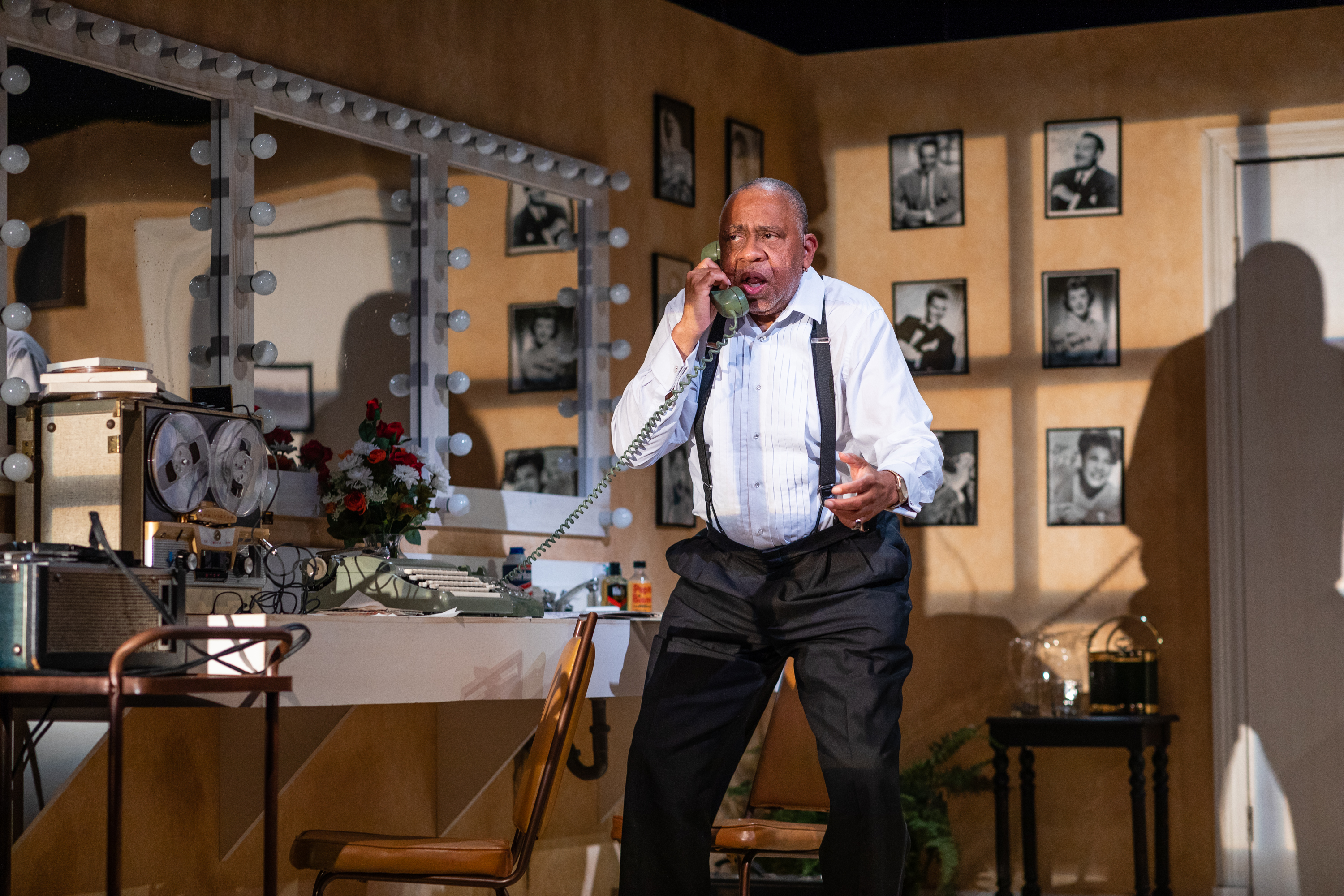
Satchmo. (Photo: Brittney Werner)
People, as we know, are not always as they seem. When we picture Louis Armstrong, aka “Satchmo,” one of the world’s most beloved jazz musicians, he is grinning ear to ear and crooning, “What a Wonderful World.” But how wonderful was his life really?
In “Satchmo at the Waldorf,” a one-man show, starring Barry Shabada Henley, at Le Petit Theatre du Vieux Carre, playwright Terry Teachout explores the dichotomy between the fabulously successful, happy-go-lucky image and the road warrior jazzman at the mercy of a controlling manager. When the lights come up, he is lying on the floor of the Waldorf Astoria dressing room, reaching for a swig on an oxygen tank. His doctor had told him: “Don’t play this gig.”
New Orleanians are familiar with the legend of Armstrong, abandoned by his father, and growing up in poverty. The Karnoffskys, a Jewish family, fed and nurtured him, even providing an advance to purchase his first cornet. When Louis fired a gun into the air, authorities sent him to the Colored Waif’s Home where he honed his musicianship in its boys’ band.
“Sometimes bad luck becomes good luck,” the trumpeter said. Performing at the orphan’s home brought the teen to the attention of Kid Ory and other jazz musicians.
Onstage at Le Petit, Henley pulled out a pendant with the Star of David, worn in homage to Jews who had helped him, the Karnoffskys and his talent agent Joe Glaser whom he often called “daddy.” In those days, especially the 1930s, black performers needed white men to make connections and keep them safe. Glaser got Chicago gangsters off his tail and opened doors for the jazzman to play before white audiences, even in the segregated South. In early tours, Armstrong was forbidden to eat in white restaurants and stay in hotels, but as this play begins, he is registered at the Waldorf in New York City.
In return, Armstrong made Glaser and his mafia partners millionaires. Though Glaser’s Associated Booking Corporation also represented Billie Holiday, Duke Ellington, Dizzy Gillespie, boxer Sugar Ray Robinson and many others, Armstrong became a megastar. He was rich, but not as wealthy as he might have been.
But Satchmo was never very interested in money. He preferred playing his horn and agreed to Glaser’s financial terms on a handshake despite his fourth wife Lucille’s warnings. Armstrong considered Glaser a great friend, yet over a 40-year relationship, was never invited to his home.
Glaser understood audiences were more interested in Pop’s personality than in hearing real jazz. So, he coached him to smile and sing in his trademark gravelly voice. Other African-American performers criticized the trumpeter for selling out; Miles Davis called him an Uncle Tom, grinning and jumping around for white folks. A New York Times critic assailed him, saying he was no longer a real musician, but a clown.
As America’s goodwill ambassador, Armstrong toured the world, always projecting the best image of the United States, but never escaped the prejudice experienced by many. He understood he had gotten lucky, meeting the right people and capturing the spirit of his era.
 NOLAbeings Multimedia artist Claire Bangser created NOLAbeings as a portrait-based story project that marries...
NOLAbeings Multimedia artist Claire Bangser created NOLAbeings as a portrait-based story project that marries...  Voodoo in New Orleans: Reviving history: New Orleans fortune telling This article takes a deep dive into the history of Voodoo in New Orleans, its hybridization with Catholicism, and its present-day place in the city's culture. The author visits fortune-tellers in the French Quarter, using their guidance as a tool for introspection rather than a deterministic predictor of the future. Through her experiences in New Orleans, the author feels a mystical connection to both the past and the future.
Voodoo in New Orleans: Reviving history: New Orleans fortune telling This article takes a deep dive into the history of Voodoo in New Orleans, its hybridization with Catholicism, and its present-day place in the city's culture. The author visits fortune-tellers in the French Quarter, using their guidance as a tool for introspection rather than a deterministic predictor of the future. Through her experiences in New Orleans, the author feels a mystical connection to both the past and the future. 